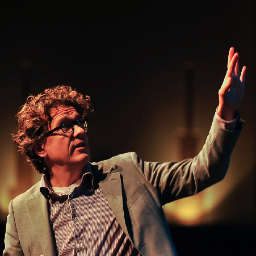MILKING THE MASSES WITH BIG DATA
October 12, 2012
 Making use of the internet population in all kinds of business processes, better known as open-source-inspired-innovation or crowdsoucing, was the thing that triggered business week in 2006 to write about “milking the masses”. In todays Big Brother world, making use of the internet population, is a lot easier. No active participation of the masses, milking is done automatically by making use of the human exhaust, the digital footprint.
Making use of the internet population in all kinds of business processes, better known as open-source-inspired-innovation or crowdsoucing, was the thing that triggered business week in 2006 to write about “milking the masses”. In todays Big Brother world, making use of the internet population, is a lot easier. No active participation of the masses, milking is done automatically by making use of the human exhaust, the digital footprint.
Will we move in the right direction?
In 2006, Jesus Villasante criticized the open-source community for getting milked in his speech at the Holland Open conference. Villasante is the current head of the trust and security unit of the European Union (DG Information Society and Media). He said:
“From the moment they [the open-source community] realize they are part of the evolution of society and try to influence it, we will be moving in the right direction.”
That message was for the open-source community. But what will happen when you and I realize that we, our data, are getting milked? In “what direction” will we move? The digital culture clash model we presented in The App Effect could give some insights.
Digital Culture Clashes
 Traditional business systems want to preserve what we have. They are presented as the source of alienation, though we face a crisis of trust. Digital subcultures in the right lower corner represent the conversation and participation economy of bloggers, trip advisors and the like. They discuss and charge. The empowered individuals in the top left corner are the activist and looters, they expose data and revolt. London riots, project X-ers, Wikileaks, ethical hackers, Anonymous.
Traditional business systems want to preserve what we have. They are presented as the source of alienation, though we face a crisis of trust. Digital subcultures in the right lower corner represent the conversation and participation economy of bloggers, trip advisors and the like. They discuss and charge. The empowered individuals in the top left corner are the activist and looters, they expose data and revolt. London riots, project X-ers, Wikileaks, ethical hackers, Anonymous.
The ambition should be to realize that only a “we all benefit” model is sustainable. That is the right direction Villasante was talking about. In the digital commons milking and being milked is part of the game since privacy is a trade off. In the case of the smart grid for instance, we need to accept smart meters in our home for better predictions of energy production and consumption. They milk your energy data and in return you get a cheaper and sustainable energy system. Pay-as-you go car insurance systems require a tracking device in your car. Your location is being “milked” but you get cheaper insurance. Same accounts for digital healthcare systems, like the one that health insurance company Menzis introduced in the Netherlands. Their pay-less-when-you-train model is built upon the idea that you provide personal data about your behavior and in return you get a low priced insurance.
Perhaps Jesus Villasante will repeat his message on the “Reloading Data Protection” conference in Brussels in 2013. A message about milking, a message about taking ourselves seriously, a message about a new kind of society and economy and a message about trusted systems. And then, as soon as we realize what we get in return, a better planet, a better price or a better service “we will be moving in the right direction”.

 English | EN
English | EN 